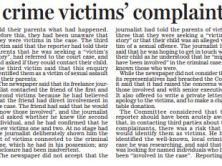
(Credit: NYTimes)
The Organization of News Ombudsmen, an international organization for news ombudsmen, public editors and standards editors,”deplores” the New York Times‘ decision this week to axe its ombudsman role and essentially fire Liz Spayd, the paper’s sixth public editor.
In a statement sent out via e-mail this afternoon, which iMediaEthics received, the current president of the Organization of News Ombudsmen (ONO), Esther Enkin, wrote that the Times’ decision is “contrary to the best interests of a free, independent, and trusted news media.” Enkin works as the ombudsman for CBC, the Canadian Broadcasting Corporation. Ombudsmen or public editor roles work independently of the newsroom and handle reader complaints and concerns. See here iMediaEthics’ stories about the work ombudsmen do across the globe.
Enkin said Times publisher Arthur Sulzberger, Jr. was “plain wrong” to claim the position was no longer necessary given the wide use of social media. “On the contrary, it is more necessary than ever. The social media space is characterized by heat and little light, angry assertions and not as many facts,” Enkin wrote, noting that by being “embedded within the news organization,” public editors have “power, effectiveness, and probably, most importantly, its credibility.”
While the Times also announced this week that it is establishing a “Reader Center,” Enkin argued that center won’t “provide the same depth and accountability.”
iMediaEthics has asked the New York Times for a response to Enkin’s criticism.
Former executive director of ONO, Jeffrey Dvorkin, told iMediaEthics that it was a “mistake” to end the public editor role, as iMediaEthics reported yesterday.
Read Enkin’s full statement below.
“The Organization of News Ombudsmen and Standards Editors deplores the elimination of the position of public editor at the New York Times. We believe this is contrary to the best interests of a free, independent and trusted news media.
“There is no doubt that the role of Public Editors and Ombudsmen is more critical than ever. To say – as Times publisher Arthur Sulzberger, Jr. did – that the position has outlived its value in the age of social media, is just plain wrong. He said that the responsibility ‘to serve as the reader’s representative has outgrown that one office.’ On the contrary, it is more necessary than ever. The social media space is characterized by heat and little light, angry assertions and not as many facts. It is the very fact that the office is embedded within the news organization that gives it its power, effectiveness, and probably most importantly, its credibility. We are the ones that know where to look, what to ask, to pull back the curtain and give members of the public an understanding of the way a news organization works. We are the ones that can demand responses from news management. News organizations truly committed to accountability make a powerful statement when someone they hire is able to criticize and question editorial decisions. News management is not able to ignore them. Ed Wasserman, dean of the Graduate School of Journalism at the University of California, Berkeley, and an associate member of ONO, has said Ombudsmen ‘represent a powerful recognition by news organizations that…routinely answering for their actions isn’t just optional but it is integral to the practice of journalism.’
“Opening all stories to comments and creating a ‘Reader Center’ just does not provide the same depth and accountability. The social media space is not an ideal place for thoughtful and in-depth analysis. At a time when there appears to be a crisis in public trust in all news organizations, it is not logical to cut the position that actually can contribute to rebuilding that trust. Social media and the degree of interactivity it brings may mean the way our work is done and how the role is defined may need to change, but to end it completely is a disservice to the public we serve.”
UPDATED: 6/3/2017 10:56 AM EST






